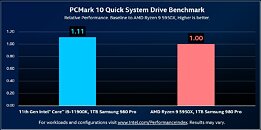Tuesday, February 23rd 2021

"Rocket Lake" Offers 11% Higher PCIe Gen4 NVMe Storage Performance: Intel
Intel claims that its upcoming 11th Gen Core "Rocket Lake-S" desktop processors offer up to 11% higher storage performance than competing AMD Ryzen 5000 processors, when using the CPU-attached M.2 NVMe slot. A performance slide released by Intel's Ryan Shrout shows a Samsung 980 PRO 1 TB PCI-Express 4.0 x4 M.2 NVMe SSD performance on a machine powered by a Core i9-11900K processor, compared to one powered by an AMD Ryzen 9 5950X. PCMark 10 Quick System Drive Benchmark is used to evaluate storage performance on both machines. On both machines a separate drive is used as the OS/boot drive, and the Samsung 980 PRO is used as a test drive, free from any OS role.
The backup page for the slide provides details of the system configurations used for both machines. What it doesn't mention, however, is whether on the AMD machine, the 980 PRO was installed on the CPU-attached M.2 NVMe slot, or one that's attached to the AMD X570 chipset. Unlike the Intel Z590, the AMD X570 puts out downstream PCI-Express 4.0, which motherboard designers can use to put out additional NVMe Gen 4 slots. On the Intel Z590 motherboard, the M.2 NVMe Gen 4 slot the drive was tested on is guaranteed to be the CPU-attached one, as the Z590 PCH puts out PCIe Gen 3 downstream lanes. A PCI-Express 4.0 x4 link is used as chipset bus on the AMD X570, offering comparable bandwidth to the DMI 3.0 x8 (PCI-Express 3.0 x8) employed on the Intel Z590. A drive capable of attaining 7 GB/s sequential transfers should be in a sub-optimal situation on a chipset-attached M.2 slot. It would be nice if Intel clears this up in an update to its backup.
Update 02:51 UTC: In response to a specific question on Twitter, on whether the drives were tested on CPU-attached M.2 slots on both platforms, Ryan Shrout stated that a PCI-Express AIC riser card was used on both platforms to ensure that the drives are CPU-attached. 11% is a significant storage performance uplift on offer.
Source:
Ryan Shrout (Twitter)
The backup page for the slide provides details of the system configurations used for both machines. What it doesn't mention, however, is whether on the AMD machine, the 980 PRO was installed on the CPU-attached M.2 NVMe slot, or one that's attached to the AMD X570 chipset. Unlike the Intel Z590, the AMD X570 puts out downstream PCI-Express 4.0, which motherboard designers can use to put out additional NVMe Gen 4 slots. On the Intel Z590 motherboard, the M.2 NVMe Gen 4 slot the drive was tested on is guaranteed to be the CPU-attached one, as the Z590 PCH puts out PCIe Gen 3 downstream lanes. A PCI-Express 4.0 x4 link is used as chipset bus on the AMD X570, offering comparable bandwidth to the DMI 3.0 x8 (PCI-Express 3.0 x8) employed on the Intel Z590. A drive capable of attaining 7 GB/s sequential transfers should be in a sub-optimal situation on a chipset-attached M.2 slot. It would be nice if Intel clears this up in an update to its backup.
Update 02:51 UTC: In response to a specific question on Twitter, on whether the drives were tested on CPU-attached M.2 slots on both platforms, Ryan Shrout stated that a PCI-Express AIC riser card was used on both platforms to ensure that the drives are CPU-attached. 11% is a significant storage performance uplift on offer.



41 Comments on "Rocket Lake" Offers 11% Higher PCIe Gen4 NVMe Storage Performance: Intel
✓ Ryan
ShillShrout, the salaried marketing bot✓ Zero attempt to use an actual storage benchmark to make storage performance claims
✓ Ah yes my NVMe doesn't perform in MB/s or IOPS, it performs in relative performance ratio
✓ Wrong motherboard name for the X570 C8H (Rampage? really?)
✓ No clarification on slots; that said it really shouldn't be a noticeable difference on most X570s, unless they overload the PCH with peripheral controllers
✓ 5950X's "PL1 105W" hahahaha what is this even supposed to refer to, either TDP 105W or PPT 142W
✓ C8H using a BIOS that Asus pulled and is no longer available
The irony of Ryan treating consumers like imbeciles is that the man himself is hardly the best and brightest in any room. If Rocket Lake actually has excellent storage performance, it'll be lost on the moronic way that it's been conveyed on these slides.
If Gelsinger really wants to turn Intel around, Ryan should be first in line for a pink slip
2. Who does storage benchmark in relative figure when everybody else use exact numbers ......
Poor Intel used a ancient 760p where the new 670p should be in-house
Poor intel has no exact data to share with us
Poor intel only has Ryan Shrout, who is more a marketing-populist that gets easily overwhelmed by real benchmarks and numbers
To be fair to Intel, AMD's stack is also pretty heterogeneous. Upper mid-range to high end occupied by Vermeer, low end to midrange (plus old high end) served by last-gen Matisse, APUs officially still handled by 2.5-generations old Picasso, ultra low end occupied by 3.5-generations old Raven Ridge. I guess neither company saw fit in the last year of DDR4 and their existing sockets to revamp the entire lineup.
Which also begs the question, does an M.2 SSD really perform better sometimes when it's actually running on a PCIe 4.0 x16 slot? Why, if the controller limits it to x4 anyway?
ok end of story
"The Quick System Drive Benchmark is a shorter test with a smaller set of less demanding real-world traces. It subjects the device to 23 GB of writes."
In addition, this test typically outputs a score and not a relative performance number.
Changing that to relative is almost certainly intentional on Intel's part to hide the scores, it doesn't make sense to take the extra effort unless you have something to hide. For all we know, Intel just kept running that short benchmark until it gave them good numbers or AMD bad ones and they hid that fact by changing score to performance index. If they had provided the scores, it would have been easy to compare to AMD's actual PCIe 4.0 performance.
Why Intel has not fired Ryan yet and the entire CPU marketing team is beyond me. Everytime I see something like this, the less likely I'm going to want to buy their upcoming CPUs.
Do I have to comment more?
Allyn is another Intel fun from PCPer, but I have to give credit to that guy. He knew about storage.
By the way the BIOS used on the Intel board is dated 17 February. Intel could have easily used version 3204 on the AMD board, which has been out since the end of January, instead of the pulled BIOS. I am sure they had a good reason to use a buggy version. smh
Games now are a little more optimised, with DirectStorage and RTX IO coming along to fix the issue next gen